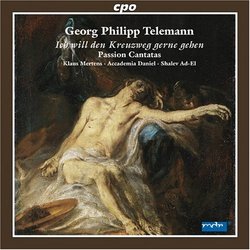| All Artists: Telemann, Mertens, Accademia Daniel, Ad-El Title: G.P. Telemann: Passion Cantatas Members Wishing: 0 Total Copies: 0 Label: Cpo Records Original Release Date: 1/1/2009 Re-Release Date: 3/31/2009 Genre: Classical Styles: Chamber Music, Historical Periods, Classical (c.1770-1830) Number of Discs: 1 SwapaCD Credits: 1 UPC: 761203729920 |
Search - Telemann, Mertens, Accademia Daniel :: G.P. Telemann: Passion Cantatas
CD Details |
CD ReviewsThe Passionate Baritone Giordano Bruno | Wherever I am, I am. | 10/06/2009 (5 out of 5 stars) "Ah, pity the poor baritone! Halfway between a tenor and a bass, or in reality not much of either, a tenor without ringing high notes or a bass without a bottom. I know; I'm one myself, and it's frustrating. Telemann described himself as a baritone in his 'job application' to Frankfurt in 1712. He got the job, by the way, though he continued to compose for his previous employers in Eisenach. In both cities, an occasional shortage of skilled singers seems to have forced Telemann to sing his own music; anyway, that's the thesis propounded in the notes to this CD by Eric Fiedler, that Telemann composed the first three cantatas recorded here for his own vocal performance. All five cantatas here are small-scale compositions -- work-a-Sunday works for one soloist, no chorus, an instrumental ensemble of eight or nine players. The first three are identified easily as compositions for use in Frankfurt; the fourth cantata is one of Telemann's earliest, part of his first cycle written for Eisenach, while the fifth cantata was composed in hamburg in 1751. It's a virtue of this CD that one can compare the early Telemann with the later; all the mastery of counterpoint and theory were evident from the first, but the melodic expressiveness had plainly grown between 1710 and 1750.
So what kind of singer was Telemann? I doubt that he was anywhere close to Klaus Mertens, or else we'd have heard more about it. He probably had a small but well-pitched voice with a narrow range, the best quality of which might have been his control of affect. That's the sort of voice these cantatas were written for. The physical demands are light, but to make them powerful an incisively operatic expression is necessary. True basso Klaus Mertens has range and resources of technique well beyond the demands of these cantatas, but he 'makes the most' of the opportunities for vocal drama they provide. He has to, in order to hold anyone's musical interest during a whole CD of one soloist singing quite similar recitativos, arias, and choral hymns. The chamber ensemble of strings, oboes and bassoon - Accademia Daniel - gives him all the 'back-up' he needs for an enjoyable performance." |

